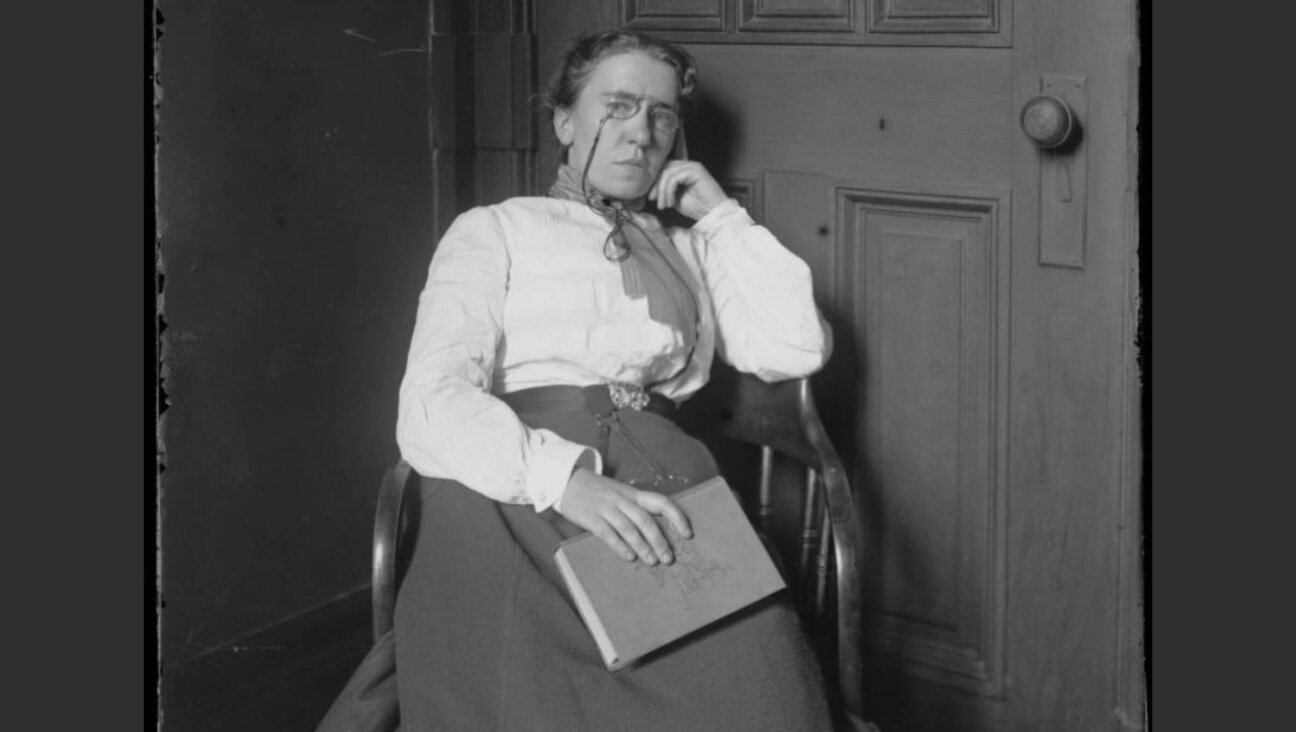My Journey To Find My Mother’s Jewish England — And How It’s Changed

Forward editor Jane Eisner with her sister Karen Zucker. Image by Courtesy Jane Eisner
In late April, my sister and I returned to Yorkshire, in the north of England, for a brief visit to explore what we could of our mother’s roots. She died nearly 13 years ago, and for almost a decade prior, Alzheimer’s disease had progressively clouded her ability to recall much about her life. I regret that I wasn’t prescient enough to put everything down before it was lost, so this trip was a reclamation project of sorts.
Since I had visited Leeds, my mother’s hometown, several times as an adult — once with her — and had reported in that part of England as a foreign correspondent for The Philadelphia Inquirer, the landscape was familiar, and I didn’t expect to discover any indication that her life was much beyond ordinary. There was family, school, work, war, friends, a tight-knit Jewish community, hardship and happiness.
And there was anti-Semitism. I knew that was a feature of life for English Jews during my mother’s lifetime, as it sadly is now. What I came to realize, however, is that we make a grave mistake by equating what happened to Jews then and what is happening now. The same is true on this side of the pond.
The distinctions may be subtle, but they are real and instructive, especially since Jews in the U.K. (and their less numerous Irish counterparts) did not face the anti-Semitic fascism that spread through continental Europe during the last century. Today, even with a resurgent nationalism on the right, a deeply troubling leader of the left-wing Labour Party and the more indiscriminate terrorism that occasionally rocks the country, the kind of prejudice that my mother and her generation experienced has faded as surely as her British accent did after living in America for decades.
And for that, I am grateful.
*

Image by Courtesy Jane Eisner
It was cold and raining when we arrived in Leeds, of course; there’s a reason the grass is so green and the umbrellas so sturdy on this island. Still, our volunteer guides, Nigel Grizzard and Tim Friedman, were warm in their welcome.
As we drove from the center of the city toward the old Jewish neighborhoods, I was continually reminded of how cities display the passage of time on every street and every building. They never stand still.
In the Leyland neighborhood just outside the city center, where my great-great grandparents once lived, the synagogue is now a Salvation Army.
The Jewish tailors’ union building is now a Thai boxing gym.
Further north — the swankier destination to which aspirational Jews headed — there’s a building that once housed the ORT Technical School. The school began in Berlin in 1937 and, fleeing the Nazis, relocated to Leeds in 1939, with 106 boys, all refugees. It remains a school, but now the students are Muslim girls.
Down the street from where my mother lived and likely where her family worshipped was the Chassidishe Synagogue, which opened in 1932 and is now shuttered. Next to it is the soaring Leeds Islamic Centre, and on the Friday morning we visited, the grounds were filled with Muslim worshippers.
“They sold it to us in the 1980s,” one Muslim man stopped to make sure he told us.
But here’s the thing. The Chassidishe Synagogue was also, in a sense, recycled. Jews moving from the Leylands — perhaps even including my family — purchased what was known as Spencer Hall, tore it down and built a place of worship for their growing population.
I will admit to mixed feelings when I actually see the physical expression of this recycling. The juxtaposition of old and new can be jarring. The magnificent New Synagogue, for instance, which opened in 1932 near where my mother lived, fell into disrepair before it was beautifully restored in the late 1980s and is now the headquarters for the Northern School of Contemporary Dance.
On the day we visited, the sanctuary was jammed with lighting equipment and scaffolding left behind from a dance performance the night before, but a kind worker gave us a quick tour. Though clearly not Jewish, he eagerly showed off the sweeping royal blue domed ceiling of the sanctuary, its Jewish star blazing in red, and the stained-glass windows with Hebraic symbols that circled the building.
He pulled up the cushions on the stately wooden seats where the men sat downstairs, saying that this was where the Jews stored their “hymnals.” Then he brought us to the back of a darkened stage to touch the marble surrounding what he said was where the organ had been located. We knew better. It was the holy ark, where Torah scrolls once were housed.
*

People wear flag of Israel glasses and hold up placards as they gather for a demonstration organised by the Campaign Against Anti-Semitism outside the head office of the British opposition Labour Party in central London on April 8, 2018. Labour leader Jeremy Corbyn has been under increasing pressure to address multiple allegations of anti-Semitism within the party, which saw protesters gather outside the party’s head office in London after Jewish campaigners demonstrated outside parliament two weeks ago. Image by Getty Images
If anti-Semitism was still deeply rooted in Britain, if discrimination against Jews was consistent and legal, this sort of natural evolution might have been harder because the Jews would have been stuck, ghettoized the way they were in continental Europe for so many centuries.
Instead, it seems that what my mother experienced in her early years in the 1930s, through World War II and until she emigrated to the United States in 1949 were more subtle restrictions.
Thanks to my sister’s sleuthing, we managed to locate Phyllis, my mother’s oldest friend from childhood, who now lives in Manchester. Her eyesight and hearing have nearly left her, but her memory was clear and joyful.
Hers was a stoic generation to be sure, surviving war, deprivation and rationing, believing fervently that only Winston Churchill stood between their freedom and a Nazi invasion. “Churchill saved us,” she said. “When he spoke, you wanted to go out and shoot the Germans.”
Anti-Semitism was simply woven into the fabric of her life. On Chapeltown Road and Roundhay Road — two big thoroughfares of north Leeds — Jews knew which shops would not hire them, so they found jobs elsewhere. “Jewish people found it very hard to find employment in non-Jewish firms. It’s why a lot of cottage industries began,” she said.
Jews knew they were not welcome in the local pubs, so they created their own places to socialize. I grew up hearing about “Jubilee Hall,” where my mother and her friends went every Sunday evening. (The building is now a facility for local musicians and start-up media companies. Of course.)
Even though they tried hard to blend in — so Anglicized were their names that my mother’s family’s name was Cross — discrimination persisted, which is one of the reasons why after the war many of those Jews, my mother included, left England for America.
*
The anti-Semitism my mother experienced in England — a version of which my father also experienced in the U.S. — prevented her from doing things simply because she was Jewish. I’ve never been prevented from doing anything because I am a Jew.
“There is an important distinction to be drawn between attitudes and behaviours,” Jonathan Boyd wrote in an email to me (hence, the British spelling). Boyd is the executive director of the Institute for Jewish Policy Research (JPR) in London and an expert on anti-Semitism.
Anti-Semitic discrimination along the lines of that my mother experienced, Boyd said, “is rare today, not least because it is illegal. The country as a whole has become much more sensitive to minority rights, so denying any ethnic or religious group access to opportunities or services because of their ethnic or religious origins is widely understood to be absolutely unacceptable.” While other experts point to an increase in anti-Semitic incidents in the U.K., violence against Jews remains, in Boyd’s words, “vanishingly rare.”
Boyd’s observations are backed up by a comprehensive report JPR released last September that claims to be the largest and most detailed survey of attitudes toward Jews and Israel ever conducted in Great Britain. The study found that only 5% of the British population consists of “people who hold a wide range of negative attitudes toward Jews.”
“There is a much larger number of people who believe a small number of negative ideas about Jews, but who may not be consciously hostile or prejudiced towards them,” the report continued. And that’s because of the diffusion of anti-Semitic ideas.
This, then, is the new concern: a greater freedom to air noxious attitudes, and the means through social media to do it. In Jeremy Corbyn’s Labour Party, many are rightly concerned that those views have moved from the margins to the mainstream — echoing the trend in the U.S., where anti-Semitism originating with the “alt-right” has found its way into political discourse and even the White House.
Will the dissemination of anti-Semitic attitudes lead to the spread of anti-Semitic behaviors? That is the fear, but so far, there is little evidence. The JPR survey found that only “1% of British society believes that violence in defence of their religious or political beliefs and values is ‘often’ justified against Jews, and a further 3% believe that it is ‘sometimes’ justified. Almost identical results are reported for any justification of violence against Zionists and Israelis.” (Italics mine.)
In fact, levels of anti-Semitism in Great Britain are among the lowest in the world.
*
My mother left Leeds not only because of the lingering discrimination against Jews, but also in the hopes of finding a better life. Most of her family came to America, too. They weren’t fleeing from something so much as they were searching for a security and prosperity that they were eventually able to find on these shores.
As we drove around the rainy streets in Leeds, I wondered what would have happened had she stayed. She had been in a terrible vehicular accident that left her hospitalized for a year, then became engaged to the man who’d been injured with her, and her decision to call off the wedding prompted the decision to leave the country. What if their romance hadn’t ended? What if Leeds had remained her home?
Seeing her house and school and synagogue now left me grateful for what this community offered my mother and her family through many generations, despite the anti-Semitism, despite the hardship.
We stopped at Roundhay Park — how often had I heard her speak of it? — a lush expanse of grass, shrubs, trees and soccer fields, on that April day punctuated with white and yellow daffodils. Next to a gazebo at the entrance is a tall clock tower that was recently renovated thanks in part to the financial contributions of a local Jewish couple, successful lawyers.
“This plaque is presented by Grahame and Marilyn Stowe in loving and eternal memory of their beloved parents and in gratitude to the City of Leeds for providing a safe haven to generations of refugees fleeing persecution.”
I am certain my mother would have agreed with that sentiment.
Jane Eisner is the Forward’s editor-in-chief. Contact her at [email protected]
















